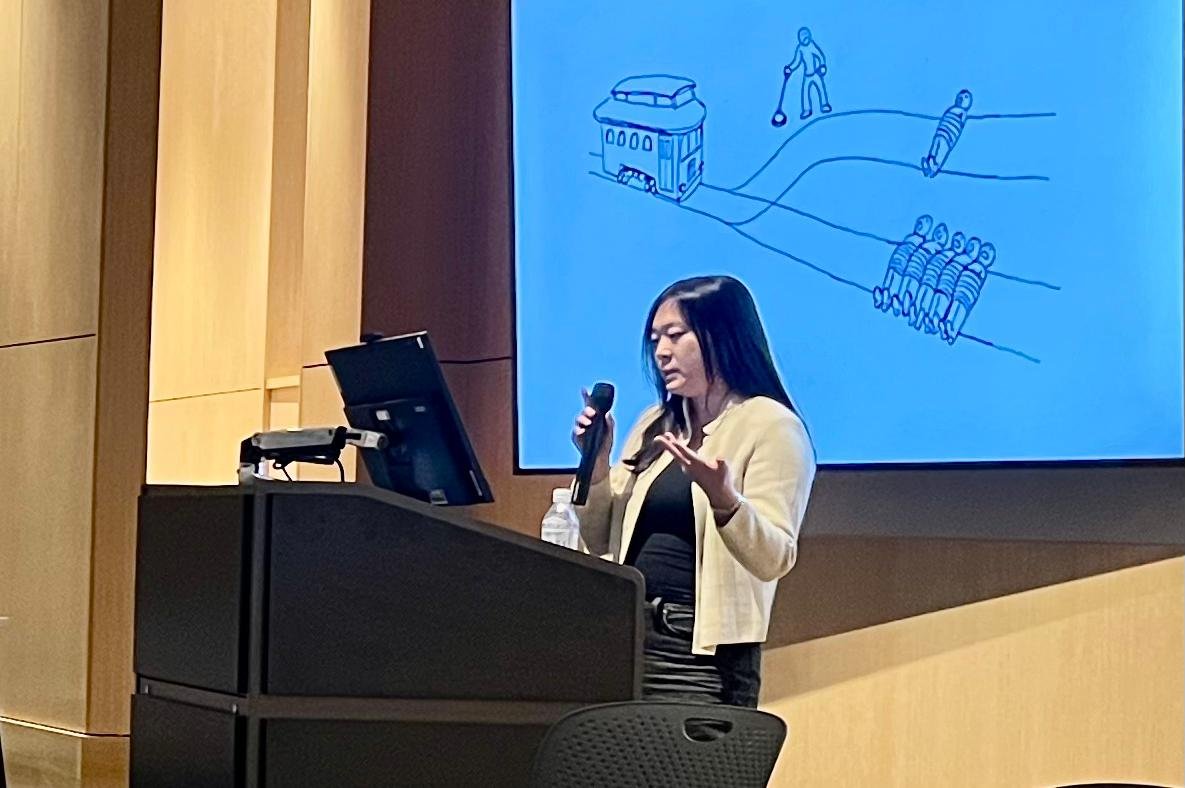“Border-Crossing Arts”: A Discussion of Speculative Fiction, Ethics and Identity
Isabel J. Kim speaking to students about science fiction writing in her "Border-Crossing Arts" lecture. Photo courtesy Dr. Sang-Keun Yoo.
Marist College welcomed the second of three guest speakers in the “Border-Crossing Arts” lecture series on Nov. 4. Isabel J. Kim, a speculative fiction writer, attorney and podcaster, gave a thought-provoking and insightful lecture that left attendees feeling inspired and motivated.
Earlier this year, Kim published a response piece to Ursula Le Guin’s “The Ones Who Walk Away from Omelas,” called “Why Don’t We Kill the Kid in the Omelas Hole.” This went viral on “book Internet,” leading to interesting conversations in the literature community. Ultimately, Dr. Sang-Keun Yoo, assistant professor of English, connected with her and asked her to share her work and thoughts at Marist.
In her thought-provoking lecture and the exciting question-and-answer session that followed, she discussed ethics, morality, representation in literature, fanfiction and efficiency in writing. Most of her lecture focused on “trolley problems,” specifically as it related to the issue raised in “The Ones Who Walk Away from Omelas.”
Kim shared that, through her story, she aimed to “force people to re-examine their relationship to ethics and point out hypocrisy and the way that trauma and tragedy [are] deployed.” She made several connections to popular culture and used conversational language to immerse readers into the story and force them to respond to it in a personal way, rather than detaching themselves from the world in the story.
Additionally, she raised the issue of trauma bystanderism — “that we all participate in as a global society” and often overlook the issues of other people depending on our relation to them.
Kim made several connections between literature, specifically the Omelas short stories, movies and social media/opinion. Kim also offered several pieces of advice for students interested in writing and publishing. Her most striking point was to “write something provocative but astounding.”
After her work went viral, she learned that her work, layered with humor and dissonance, was interpreted in several ways she didn’t expect. In the end, she shared that this is bound to happen to all writers who publish their work and that it should be welcomed as it inspires interesting conversations.
Kim also brought up the interesting point of hypocritical gender standards in literature. She explained that — more so in the past — strong female characters were portrayed as harsh and daring, but never perfect enough to be a main protagonist. On the other hand, male protagonists are allowed to be flawed and imperfect, which serves to make them more appealing to the readers. She further expressed how female characters’ value often relies on how useful they are to the male protagonist.
In her lecture, Kim also shared exclusive parts of a new manuscript that she hasn’t yet made open to the public. The excerpts shared illustrate her identity as Korean-American and how that has shaped her relationship with and experiences living in America.
Those who attended the lecture expressed that Kim’s words were compelling, and some students were able to make connections with her afterward.
“[The lecture] took my thinking to a place that it otherwise would not have gone,” said Sean Murphy Garabedian ‘27. “The way she talked about complex moral questions was really down to earth and really great for shy college students”.
The final speaker of the lecture series, Eozin Che, will be coming to Marist on Monday, Nov. 18. Her lecture will blend the science and art aspects of the series together, as she speaks on her experience as a lead creative technologist at the American Museum of Natural History.
